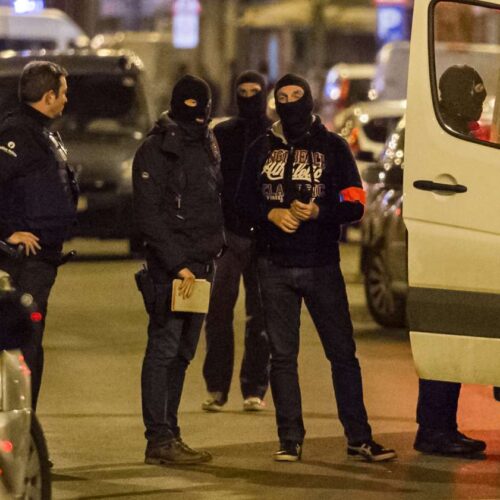Introduction
Within hours of the March 22 terrorist attacks in Brussels, New York city authorities deployed roughly 400 National Guard troops at major transit hubs in New York City, and transit police in Washington D.C. also ordered a surge at subway stops. The Washington police tweeted reassuringly that they were “closely monitoring events in Brussels w/our fed partners.”
Visibly surging security personnel in urban centers after a major terrorist incident has become a habitual response around the globe since the 9/11 attacks in New York and Washington, putting citizens on edge and occasionally causing policing expenses to spike. But it turns out there’s little evidence that such an aggressive public response is necessary, according to a new report by terrorism experts at the RAND Corporation.
The experts studied 140,000 terror attacks in the United States and Europe between 1970 and 2013, and found no statistically significant evidence after 2003 that one big attack will spawn another one immediately afterward, producing a “cluster” of related incidents.
“Visible increases in security reflect prudence, but also suggest that there is reason to worry about further terrorist attacks,” experts Brian Jenkins, Henry Willis and Bing Han wrote in their report, published on March 31. But since 2003, they said, terrorist attacks in Western countries have actually not been occurring in clusters, which they define as falling within a 30-day period.
The incidents studied were listed in a global database of terrorism events that produced at least one fatality. The database was compiled from open sources by the University of Maryland.
Before 2003, some terrorist attacks did occur in clusters, suggesting that officials in Europe and the United States might now be reacting reflexively to a pattern that is no longer prevalent. The Provisional Irish Republican Army (IRA), for example, carried out clusters of attacks in Ireland and the United Kingdom in the 1970s, 1980s and 1990s, and Basque separatists in Spain, ETA, carried out clusters of attacks starting in the 1970s. But the clustering phenomenon started to drop off by 1993, and now there is no statistical evidence that a large terrorist attack will trigger or inspire another attack.
“Jihadists have not been able to field groups in the United States or Europe that are capable of sustaining terrorist campaigns like those that operated in Europe from the 1970s to the early 1990s or in the United States primarily during the 1970s,” the authors explain.
The report also disputes another commonly-held view about the timing of terrorist attacks. Terrorists generally have not attacked on symbolically important dates in the U.S. and Europe. While attacks increased slightly on dates around Independence Day and New Years’ Eve, the evidence did not show any increased likelihood of attacks on anniversaries such as September 11 or other symbolic dates such as Ramadan or Christmas.
Some experts who study terrorism say they doubt that terrorists keep a calendar. Attacks are timed when those involved conclude they will be successful. The RAND authors state that Independence Day and New Years’ Eve, for instance, draw large crowds that represent a vulnerable target.
A third, surprising argument in the report is that terrorism in the West has been declining. The incidence of attacks decreased roughly 94 percent between 1976 and 2013, the RAND tally showed, again reflecting the different capabilities of European paramilitary groups and present day jihadists.
At the same time, the deadliness of recent attacks has increased. The scale of the 9/11 attacks was “unprecedented.” And since then, the proportion of incidents with more than three fatalities has increased.
Some experts said they didn’t take much comfort from the new report. With respect to “some of the European [jihadist] plotters who were captured, we now know that they had been planning a series of attacks. It calls into question how reliable this finding is,” said Jessica Stern, a research professor at Boston University’s Pardee School of Global Studies who has interviewed terrorists and written several books on their motivations.
The RAND authors acknowledged that they could not rule out that police surges had deterred some coordinated or copycat attacks. And they also warned that the future might not be like the past: “It’s important to monitor” whether terrorism related to the Islamic State will be different, said Henry Willis, director of the RAND Corporation’s Homeland Security and Defense Center and one of the study authors, in an interview.
Stern said that there’s some evidence of a shift already. “Most of the attacks we’ve seen until now carried out in ISIS’s name are not the kind of attack we would expect to be clustering –they’re individuals who radicalize themselves or small groups that seem to have minimal if any contact with ISIS… [But] the kind of attacks we’ve seen in Paris and Belgium are not that kind. They involved highly trained operatives and they’re part of a plot that’s a broader attack.”
Belgian authorities have reported in recent days that those involved in the Paris attacks were planning additional bombings there – months later — but undertook the March 22 attacks in Brussels instead because they feared that police were closing in.
Lauren Chadwick is a Scoville Fellow at the Center for Public Integrity.
This article was co-published with Slate.
Read more in National Security
Up in Arms
Auditors criticize Pentagon for wasting property and ammunition
The Defense Department is a star in the GAO’s annual report on misspent federal funds
National Security
‘The army to set our nation free’
Former Sheriff Richard Mack has a plan to roll back gun control, tax laws and land-use constraints, one defiant local law enforcement official at a time


Join the conversation
Show Comments